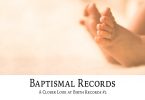There are dozens, even hundreds, of different records you can use to compile your family history when doing genealogy research. Each one tells a different story about your ancestor. When you put them all together, resolve any discrepancies between them, and use your genealogical skills to read between the lines, you get a fuller, richer picture of your ancestor’s life and times. That’s the ultimate goal of the advanced and/or professional researcher. Discovering as many records as you can that mention your ancestors is key to getting every last possible detail about their lives.
While you may think it’s a basic thing to use birth records in genealogy, these records can be useful for advanced researchers in entirely new ways. Every genealogist should start with using the basic birth, death, marriage, and census records pertaining to their ancestors. Here are some tips for how advanced researchers can use birth records to ensure success in their genealogy.
1. Look at the Birth Records You Already Have Again
Have you taken a really close look at your birth records? Depending on the time period and area from which they came, they may give you a lot of information on an ancestor and their family, or just a little. Either way, it is worth it to look at them again and examine them more closely. Look for more than just their birth name and date. Look at the names of the parents, the place of birth, whether the parents were married or had any other children, the name of the attending doctor at the birth, the date the birth certificate was filed, where the parents were born, and more. While most genealogists will have looked at most of these items, some won’t, and plenty won’t have paid attention to every detail. All of those details tell a story, and they should be recorded in the fact fields and notes sections of your family tree software.
2. Compare Birth Records to Other Records
One of the reasons it is so important to pay attention to and record every detail, no matter how seemingly unimportant, from an ancestor’s birth record, is so you can compare it to the information you have in other records. Does it match up to death and marriage record information? Is the information in the birth record the same as in obituaries, life stories/interviews, or marriage records of your ancestors in old newspaper records? Is it the same as the information you’ve been told about your ancestor?
If the information all matches up with other sources, you can be relatively certain it is all correct. If it is different from other sources, or if there are discrepancies in some of the facts on the birth record compared to other records, that means you need to do additional research to determine the true story. Look at who provided the information on the birth record as compared to who provided it on other records. Would any of these people have a reason to lie about certain information? Would they have possibly forgotten or never been clear on certain details they provided? Was the information provided by a person removed by one or more generations from the event, or by someone who wasn’t even a relative? How accurate and trustworthy are these sources? These are all things you need to consider and investigate when you compare discrepancies in information on birth records to other records.
3. Use the Birth Record to Find Other Records
Based on the date of birth on the birth record, you can guess what other records may exist for your ancestor and when and where you may find them. As an example, was your ancestor born at least 18 to 20 years before a war (but no more than 60 years before it)? If your ancestor was a male, you may be able to find a draft or service record for them. You may also find a pension record for their military service for them or one filed by their widow. You can also use the date of birth to estimate when a marriage might have occurred, or the birth of children. Any natural disasters that may have caused the family to move after the birth can send you in the direction of new records. You can also use the names of the parents to look up records pertaining to them.
While not every ancestor is going to have a birth record or even a church baptismal record, to give you their birth date and names of parents, plenty of them will. If you use these records like a pro genealogist, you will be led to so much more information on these ancestors than you could imagine. It will greatly enhance your family tree and your enjoyment of genealogy. So, be sure to use these tricks to take your genealogy to the next level.






